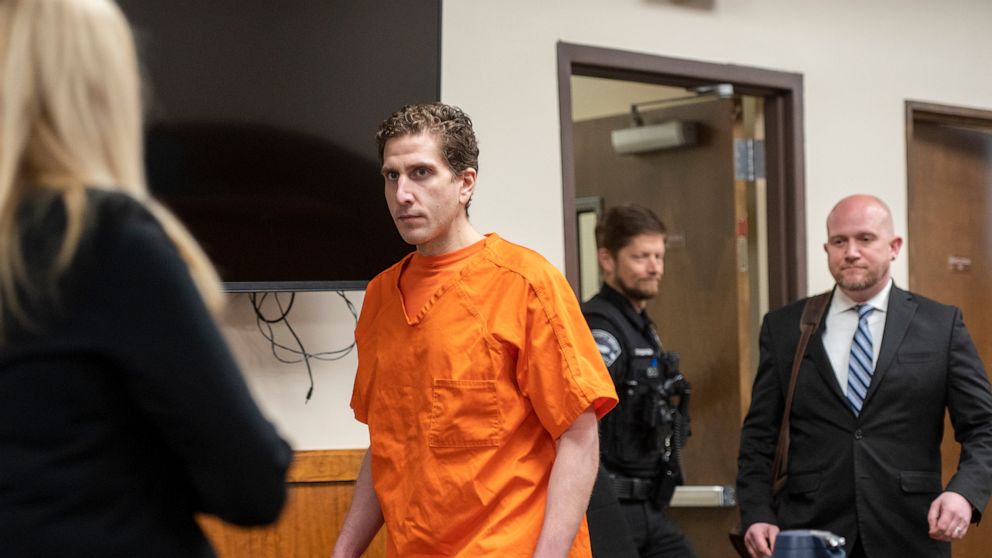Justice may be blind, but it’s not cheap.
Prosecutors in Moscow, Idaho, this week said the upcoming prosecution of Bryan Kohberger, the man charged with killing four college students last fall, could cost more than eight times their entire annual trial budget.
Meeting with county commissioners Tuesday, Latah County Prosecutor Bill Thompson requested a $135,000 budget, as his team puts together what is expected to be a complicated and high-profile case.
Thompson said they know the trial “is not going to be cheap,” according to the minutes from the meeting, obtained by ABC News, acknowledging the request is a significant departure from the $15,000 budget they had maintained “for years and years.”
Thompson said his office is trying to keep its projected budget “as conservative as possible,” while at the same time “[making] sure the case is handled properly.”
Among the anticipated expenses, Thompson’s budget request cites “witness travel fees, transcript fees, exhibit display expenses [and] postage fees,” as well as “travel associated with case development, expert witnesses and other associated trial expenses,” according to the budget request.
Thompson said his office is also proposing to add a “part-time legal assistant” position to the payroll in order to help shoulder the workload, according to the meeting minutes.
One of the commissioners on the board, Kathie LaFortune, suggested an even larger allowance for Thompson’s budget, according to meeting minutes, suggesting an increase to $150,000 in order to fully cover potential costs.
Separately, the defense has been augmenting its resources, as well.
Kohberger’s lead counsel, the chief public defender in neighboring Kootenai County, Anne Taylor, is receiving $200 an hour — an amount agreed to by Latah County upon her hiring. Taylor’s co-counsel is receiving $180 an hour. Additional further expenses to the case include hiring a private investigator and experts’ services to aid their case.
Kohberger, 28, was indicted last month and charged with four counts of first-degree murder and one count of burglary. At his arraignment in late May, Kohberger declined to offer a plea, so the judge entered a not-guilty plea on his behalf.
A trial date has been set for Oct. 2.
Kohberger is currently being held in the Latah County Jail in Moscow.
Prosecutors allege that in the early morning hours of Nov. 13, 2022, Kohberger, a criminology Ph.D. student at Washington State University, broke into an off-campus home and stabbed to death four University of Idaho students: Ethan Chapin, 20; Madison Mogen, 21; Xana Kernodle, 20, and Kaylee Goncalves, 21.
After a more than six-week hunt, police zeroed in on Kohberger as a suspect, tracking his white Hyundai Elantra, cell phone signal data, and recovering what authorities say was his DNA on a knife sheath found next to one of the victims’ bodies, according to court documents. He was arrested on Dec. 30, 2022, in Pennsylvania, after driving cross-country to spend the holidays at his family home in Albrightsville.
The quadruple homicide in November rocked Moscow, Idaho, the college town where the killings occurred; the ensuing investigation, and impending trial, strained the city’s already slim budget.
Police overtime and other expenses mounted exponentially, with the ongoing need for increased patrols and law enforcement work — and shouldered by a short-staffed force putting in long hours.
The bottom line, officials said: The ongoing cost of the case has burned through cash that could have gone to benefit the community and fix up city infrastructure.
“Moscow is not awash in a funding excess,” Moscow Mayor Art Bettge told ABC News in May. “We run a very, very lean budget, and the impact of the investigation has been felt on the budget.”
Even with a suspect in custody, the ongoing investigation had depleted Moscow’s coffers and scrambled an already fragile balance sheet, city officials said.
“You budget for fires. You budget for floods. You prepare for natural disasters. This was not natural,” Moscow City Council member Sandra Kelly told ABC News. “The cost is astronomical. And of course, you can’t skimp on keeping people safe. Yet, this is just not something you budget for — because it’s something you’d never dream could happen.”

